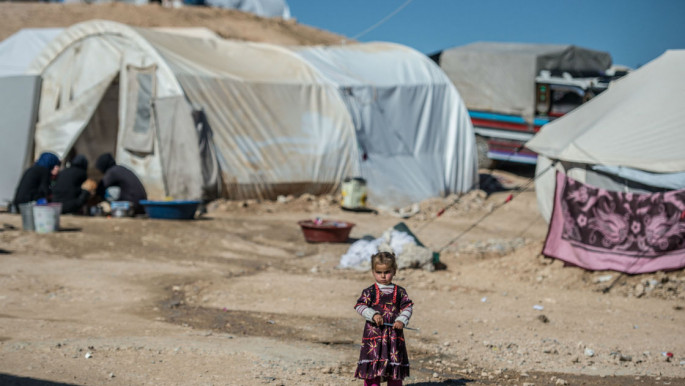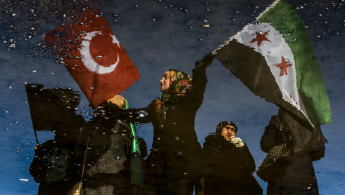Turkey hopes to keep toe-hold in Syria
Turkey hopes to keep toe-hold in Syria
In-depth: Russia is betting on Turkey to convince rebels to agree to its 'ceasefire', while Ankara wants to dispel Kurdish aspirations of a state in Syria, writes Paul Iddon.
5 min read
Turkey wants to retain influence beyond its southern border, reflects Paul Iddon [AFP]
In planned talks in Kazakhstan later this month, Iran, Russia and Turkey are set to negotiate the future of Syria.
Each power has differing objectives in that country, some of which may be reconcilable. Ankara looks set to negotiate in hope it can continue controlling its toe-hold in northwestern Syria.
"The common statement that they all will respect the sovereignty of Syria struck me as a clear statement of intent and common goals," Professor Joshua Landis, a Syria expert, told The New Arab. "The Syrian government remains fighting on 56 different fronts and is in no shape to replace Turkey today."
Turkey has long sought a buffer-zone in northern Syria, a zone of Syrian territory free from control of the Syrian regime and groups Turkey opposes. A zone in Syrian territory that could house Syrians displaced by the war, and thus stop them from adding to Turkey's already enormous Syrian refugee population.
Ankara has, at least partially, carved out this zone in a sizable swathe of northwestern Syria. Since launching its Euphrates Shield operation on August 24, Turkey has secured a stretch of territory extending as far south as the periphery of al-Bab, an Islamic State group-occupied city currently under siege by the Free Syrian Army (FSA), which is supported by Turkey.
Euphrates Shield also has the conspicuous aim of preventing the Syrian Kurdish Democratic Union Party (PYD) from seizing that remaining part of Syria's northern border with Turkey to link together the cantons that make up Syria Kurdistan (Rojava).
"I think Erdogan will have a difficult time getting Assad to accept a rebel-held state," Landis added. "But Erdogan is stubborn, his first priority is that the PYD and the Kurds of Rojava do not have an independent military.
"I presume he will trade the rebels for greater constraints on Kurdish autonomy in order to guarantee that the PKK [Kurdistan Workers Party] does not have a safe harbour in Syria."
A senior Turkish government official, who chose not to be named, recently told Reuters that Ankara's priority "is not to see Assad go, but for terrorism to be defeated".
"It doesn't mean we approve of Assad," the official added. "But we have come to an understanding. When Islamic State is wiped out, Russia may support Turkey in Syria finishing off the PKK."
Ankara makes no distinction between the PKK and the Syrian Kurdish PYD. While Turkey has targeted the latter in Syria, it is not currently in a full state of war against them.
The US has supported Turkish operations against IS along the border, but not attacks against the Syrian Kurds - with whom Washington is allied against IS.
The Pentagon also relinquished air support to Euphrates Shield as the Turkish-backed FSA fighters moved on al-Bab, since the city was too far south of the Turkish border. As Ankara's frustrations with Washington grew, Moscow entered the fray, dropping bombs of its own on al-Bab in support of Turkey's efforts there.
Shortly thereafter, the US renewed air support to Turkish efforts in this region, possibly to stop the Turks from seeking further military assistance from Moscow.
Turkey relinquishing support to anti-Assad opposition groups would be very substantial, and a welcome development in Damascus, Moscow and Tehran. The Turkish-backed Jaish al-Fatah coalition of Islamists fighting Assad managed to overrun the majority of the northwestern Syrian province of Idlib in late March 2015.
The fall of the city of Idlib, that region's provincial capital, proved to be quite a blow to the regime since it is one of only two of Syria's provincial capitals, the other being the IS stronghold of Raqqa, that the regime lost complete control over.
Furthermore, a concerted Turkish effort to stop foreign fighters from crossing the Turkish border would severely limit the ability of various groups to recruit fighters from outside Syria.
Timur Akhmetov, a research specialist on Russia-Turkey relations, sees Turkey's inclusion in the talks as a Russian bid to push Ankara to get Assad's opponents to accept the ceasefire agreement the three powers managed to establish late in December.
"Russia wants to bring the military conflict into a political one, with armed opposition accepting the rules of game, thus running talks with the existing political regime in Damascus," Akhmetov explained. "Turkey seems to be the best foreign power that can make the armed groups accept the ceasefire agreement.
"Turkey has to participate in the Russian initiatives, because closer cooperation and at times following the Kremlin's calls is the only way Ankara can get enough support for its military operation against the PYD," he added.
Akhmetov believes that Russia is hoping Turkey will behave in a "responsible" way in this process: "In return it is expected to be allowed to deal with its security problems in northern Syria, at least as long as its presence in northern Syria doesn't represent a threat to Damascus."
"Russia totally understands and accepts Turkish concerns regarding the PYD," he concluded. "Partly it comes from Moscow preference for dealing with state actors rather than non-state ones."
Each power has differing objectives in that country, some of which may be reconcilable. Ankara looks set to negotiate in hope it can continue controlling its toe-hold in northwestern Syria.
"The common statement that they all will respect the sovereignty of Syria struck me as a clear statement of intent and common goals," Professor Joshua Landis, a Syria expert, told The New Arab. "The Syrian government remains fighting on 56 different fronts and is in no shape to replace Turkey today."
Turkey has long sought a buffer-zone in northern Syria, a zone of Syrian territory free from control of the Syrian regime and groups Turkey opposes. A zone in Syrian territory that could house Syrians displaced by the war, and thus stop them from adding to Turkey's already enormous Syrian refugee population.
Ankara has, at least partially, carved out this zone in a sizable swathe of northwestern Syria. Since launching its Euphrates Shield operation on August 24, Turkey has secured a stretch of territory extending as far south as the periphery of al-Bab, an Islamic State group-occupied city currently under siege by the Free Syrian Army (FSA), which is supported by Turkey.
 |
I think Erdogan will have a difficult time getting Assad to accept a rebel-held state |  |
Euphrates Shield also has the conspicuous aim of preventing the Syrian Kurdish Democratic Union Party (PYD) from seizing that remaining part of Syria's northern border with Turkey to link together the cantons that make up Syria Kurdistan (Rojava).
"I think Erdogan will have a difficult time getting Assad to accept a rebel-held state," Landis added. "But Erdogan is stubborn, his first priority is that the PYD and the Kurds of Rojava do not have an independent military.
"I presume he will trade the rebels for greater constraints on Kurdish autonomy in order to guarantee that the PKK [Kurdistan Workers Party] does not have a safe harbour in Syria."
A senior Turkish government official, who chose not to be named, recently told Reuters that Ankara's priority "is not to see Assad go, but for terrorism to be defeated".
"It doesn't mean we approve of Assad," the official added. "But we have come to an understanding. When Islamic State is wiped out, Russia may support Turkey in Syria finishing off the PKK."
Ankara makes no distinction between the PKK and the Syrian Kurdish PYD. While Turkey has targeted the latter in Syria, it is not currently in a full state of war against them.
| Article continues below |
 |
| Turkey has carved out a space of northern Syria for Syrians displaced by violence to receive aid without entering Turkey [AFP] |
The US has supported Turkish operations against IS along the border, but not attacks against the Syrian Kurds - with whom Washington is allied against IS.
The Pentagon also relinquished air support to Euphrates Shield as the Turkish-backed FSA fighters moved on al-Bab, since the city was too far south of the Turkish border. As Ankara's frustrations with Washington grew, Moscow entered the fray, dropping bombs of its own on al-Bab in support of Turkey's efforts there.
Shortly thereafter, the US renewed air support to Turkish efforts in this region, possibly to stop the Turks from seeking further military assistance from Moscow.
Turkey relinquishing support to anti-Assad opposition groups would be very substantial, and a welcome development in Damascus, Moscow and Tehran. The Turkish-backed Jaish al-Fatah coalition of Islamists fighting Assad managed to overrun the majority of the northwestern Syrian province of Idlib in late March 2015.
The fall of the city of Idlib, that region's provincial capital, proved to be quite a blow to the regime since it is one of only two of Syria's provincial capitals, the other being the IS stronghold of Raqqa, that the regime lost complete control over.
Furthermore, a concerted Turkish effort to stop foreign fighters from crossing the Turkish border would severely limit the ability of various groups to recruit fighters from outside Syria.
 |
Turkey seems to be the best foreign power that can make the armed groups accept the ceasefire agreement |  |
Timur Akhmetov, a research specialist on Russia-Turkey relations, sees Turkey's inclusion in the talks as a Russian bid to push Ankara to get Assad's opponents to accept the ceasefire agreement the three powers managed to establish late in December.
"Russia wants to bring the military conflict into a political one, with armed opposition accepting the rules of game, thus running talks with the existing political regime in Damascus," Akhmetov explained. "Turkey seems to be the best foreign power that can make the armed groups accept the ceasefire agreement.
"Turkey has to participate in the Russian initiatives, because closer cooperation and at times following the Kremlin's calls is the only way Ankara can get enough support for its military operation against the PYD," he added.
Akhmetov believes that Russia is hoping Turkey will behave in a "responsible" way in this process: "In return it is expected to be allowed to deal with its security problems in northern Syria, at least as long as its presence in northern Syria doesn't represent a threat to Damascus."
"Russia totally understands and accepts Turkish concerns regarding the PYD," he concluded. "Partly it comes from Moscow preference for dealing with state actors rather than non-state ones."
Paul Iddon is a freelance journalist based in Erbil, Iraqi Kurdistan who writes about Middle East affairs.
Follow him on Twitter: @pauliddon



